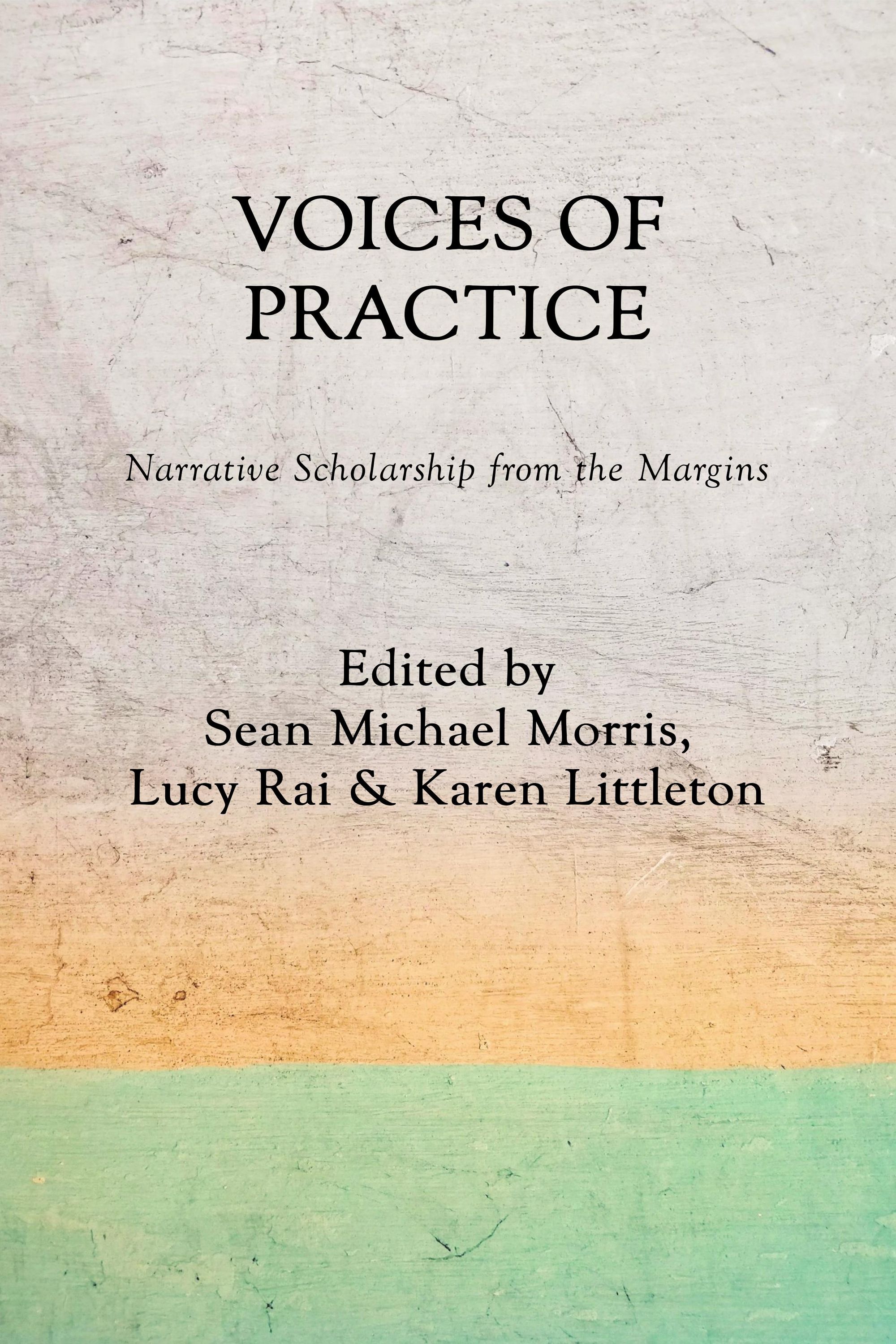This article is part of a new edited collection released March 16, 2021—Voices of Practice: Narrative Scholarship from the Margins. The collection features stories of personal growth, challenge, inquiry, and in some cases resistance to the expectations of what counts as scholarship, and who may be counted as a scholar. The complete book is available in paperback and Kindle editions. Additionally, the book is available open access online. Proceeds from the book help continue the mission of the Hybrid Pedagogy non-profit. This is the fourth print publication from Hybrid Pedagogy Books. Our other most recent collection, Hybrid Teaching: Pedagogy, People, Politics, was released February 23, 2021.
Foreword by Maha Bali
“[M]arginality [is] much more than a site of deprivation; in fact...it is also the site of radical possibility, a space of resistance. It was this marginality... as a central location for the production of a counter-hegemonic discourse that is not just found in words but in habits of being and the way one lives. As such, I was not speaking of a marginality one wishes to lose – to give up or surrender as part of moving into the center – but rather of a site one stays in, clings to even, because it nourishes one’s capacity to resist. It offers to one the possibility of radical perspective from which to see and create, to imagine alternatives, new worlds” ~ bell hooks, "Choosing the margin as a space of radical openness."
I like to play solitaire sometimes to relax. My grandma taught me as a kid, and it's nice to have that little part of her with me into adulthood. There's something about the routine, but not routineness of it, physically holding the cards, the light decision making, that helps empty my mind a bit when it's been going full speed. Or double speed as was the case since the pandemic hit, which for some reason made me start playing solitaire sometimes. I often play it on the couch somewhere, and my daughter often sits on the other side and plays along if she is in the mood. The other day, she decided to play solitaire on her own. I was sitting far away, but when I passed by to watch her playing, I noticed that she was playing solitaire upside down, you know, as if someone else was the main player, and she was on the sidelines helping out? I laughed so hard at the time (she's still a little mad at me for laughing at her expense), but when I thought about it, I realized something important. She had learned to play solitaire as a secondary, not main player, and solitaire, from her perspective, looked this way: upside down. It never occurred to her to reverse it now that she was the primary player. My laughing at her stems from my privilege of having been the primary player for a long time. I didn't see it from her perspective. I found it odd, quaint, amusing. But now I realize that this is what it means to be on the margins and to internalize that perspective. And in reality, that's not a bad thing, though people in the centers, those who dominate, want us to think that our goal should be to become "like them", to lose that marginal perspective.
The other day, I was emailing back and forth with someone I'd met online and whose job title I didn't know. I had given a Hyflex workshop for faculty at her institution, after she had met me at an online conference, and I was asking her to write a letter supporting an award I was applying for. Her letter was incredible, but what shocked me was discovering her title "Dean of Online Learning," an administrative position at her institution. I told her I was amazed because she was so open and friendly and caring, and we don't often associate those characteristics with administrators, unfortunately (I want to admit this is me stereotyping, of course, because I know many kind administrators). She told me how she was a first generation college student and marginal in so many ways, but took the decision to take on admin roles in her institution. I thought about how all the ways she was marginal, all her experiences and her history, probably helped shape the kind of person she is today. Holding on to that is possibly what makes her a more compassionate administrator than those who have had a life of privilege. Or who would rather leave their marginality behind as they gain power and become closer to the center.
I'm one of those people who is semi-privileged. I learned later the term intersectionality. I am a woman in my part of the world, with all the oppression this brings on, who studied a STEM field, with all the gendered challenges there, but I also grew up relatively financially privileged, with well-educated parents. I am an Egyptian working at an American institution, so I know my "place" as a postcolonial and am reminded of it every day, in the inequalities created by the hybridity of my bicultural institution, and my need to assert all the Westernized parts of myself in order to succeed there, and more as an academic in the world, but never quite reach everything. To always aim to challenge academic gatekeeping, but never truly dismantle it. The master's tools, of course.
I'm a faculty developer, currently an associate professor of practice, an alt-ac (alternative academic), who remembers being a staff member at the Center for Learning and Teaching, given responsibility for advising faculty members with years of teaching experience, but having no authority or power to do so. I have much more power now, as a PhD holder, as a professor (albeit non-tenure-track, only teaching one course a semester). I will never forget being told "Yes, but what about the real faculty?", something my first boss used to ask whenever I gave my viewpoint on something as an academic who teaches. She was my mentor and she meant well. I don't think she meant I wasn't "real" as much as that I was radical in my views about pedagogy.
Gaining power in position, I still maintained a kind of peripherality in my perspectives, which I held onto with a passion that would not budge "because the institution wanted me to" talk about outcomes or rubrics or plagiarism detection or learning management systems / virtual learning environments. I would have none of it. I fed on my own dissent. And everyone would know it. Of course I wasn't like the "real" faculty. I was way ahead of them. Well, not really. But I was different from many of them. I gained confidence when I got my PhD. People suddenly considered me more credible. I swear I was saying these things for years, and then once I was awarded a PhD, suddenly, I was more credible. It was baffling. I say all this, and I am quite vocal, but sometimes I do things that I think might get me into trouble and I don't talk about them too loudly in my institution. Only on Twitter and my blog and in front of the world.
Although, in reality, when you get close to people and you whisper to them about how you never really follow the calendar or order on your syllabus, you realize that many others don't either. They just don't talk about it out loud. Even when I used Twitter and my blog and all my public scholarship to spread my views, to find communities who think like me, to help me grow in the direction I wanted, even after I became invited for keynotes and invited to contribute to book chapters, and expert panels and advisory boards, and what have you… I always wondered if they chose me as a "token international" or "token global South" person. I never knew where exactly I belonged, in my own institution, and in my online spaces. So I kind of went and co-created my own, like Virtually Connecting, and Equity Unbound, and worked with others on developing a practice of Intentionally Equitable Hospitality that strives to ensure our spaces are hospitable to those furthest from justice, that they have a say in what kind of table they want to work on and whom they want to invite to it, under which terms.
Still, despite all kinds of microaggressions I have faced at my institution (especially by older males when I was early in my career), and despite systemic inequalities I try to fight in whatever capacity I can (as a member of the American Association of University Professors, a senate member, writing publicly or locally, in conversations, in my own classes and workshops), I still love being in academia, fighting for the rights of students, white collar staff, blue collar workers, and even sometimes faculty when they've been harmed. I still believe that education matters and can make a difference in the world. We know this when students contact us years later to check on us or tell us how we've impacted their lives. I knew it when during the coronavirus pandemic, faculty who had worked with my center for years felt calmer than most people, felt somewhat more prepared for this moment, and rolled up their sleeves to help out.
Marginality can be visible and invisible. Class background. Sexuality. Chronic or temporary disability when you're communicating online. Those at the centers can never see what it looks like to be on the margins, because the world looks different from the margins. Like when my daughter saw solitaire upside down.
This unique perspective, especially on suffering and in-betweenness, is why we need to have voices from the margins in our textbooks, teaching our classrooms, managing our educational institutions and representing us in media and in government. This is why Kamala Harris matters so much to girls, black women, Asians and immigrants in America. Because cognitively understanding systemic inequalities does not prepare you to truly understand the experiences of being marginal/ized.
Margins are a site of struggle and resistance. And bringing voices from the margins together and centering them, diverse as each one of them is, has been one of the most eye-opening learning experiences I have ever had, and requires a tremendous amount of epistemic listening because it is not what we are used to reading daily, and it challenges our perspective on the world.
I still don't always know where I belong, as some authors in this volume will tell you. I started to see how my "imposter syndrome" is a result of interpersonal oppression intermingled with institutional and systemic oppression, and that we internalize this oppression to an extent that can be harmful. But it also makes us who we are, and gives us a unique perspective that is worth holding onto.

Get a copy of Voices of Practice: Narrative Scholarship from the Margins

